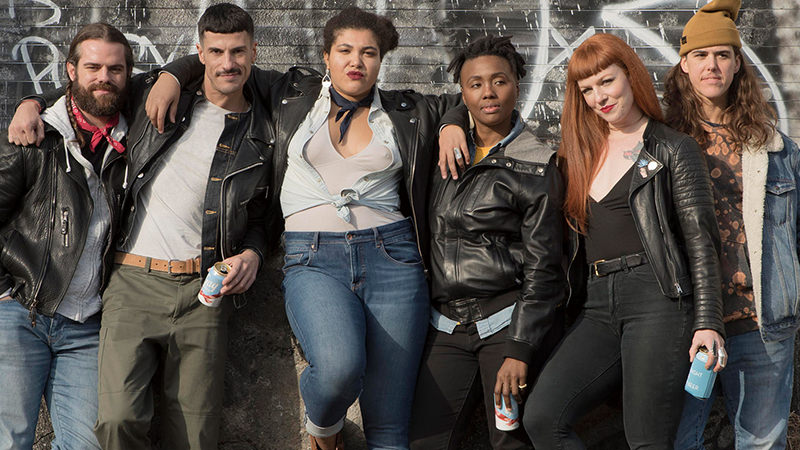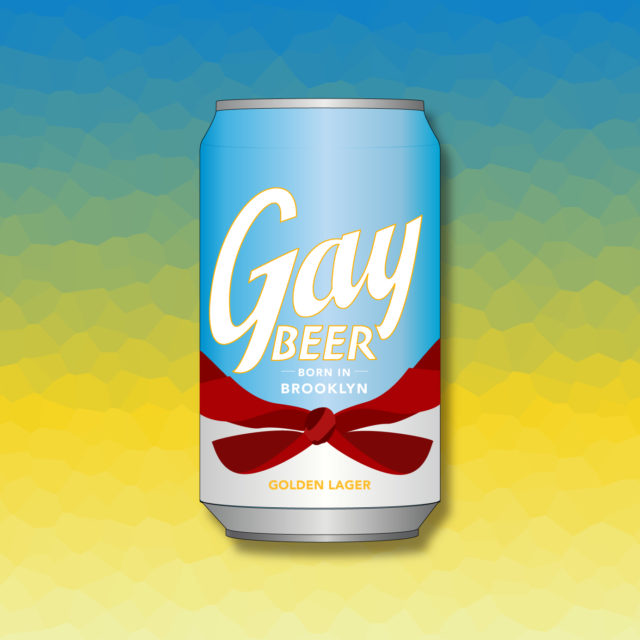“Babe, can you grab me a beer?” asks a beefy, sports-watching man in an online advertisement launched this month by Loyal Brands. “Babe,” a svelte-looking man, joins Beefy on the couch with two beers. The punchline, of course, is that they are drinking Gay Beer.
“The connotation that queer people and women don’t drink beer is ridiculous,” Jason Pazmino, co-founder of Loyal Brands and co-creator of Gay Beer, which launched in December 2018, tells VinePair. “We see an opportunity to speak to a consumer base that has been left out.”
Loyal Brands aims to answer the question, “Why has nobody ever marketed a beer authentically to our community?” according to co-founder Jon Moore.
Gay Beer proposes an answer, but it comes with its own challenges. “The queer community has really strong brand loyalty,” Pazmino says. However, he adds, “It’s a really fine line between, ‘we’re going to rally behind this because it really truly supports our community,’ or it’s a big huge eye roll.”
As millions celebrate WorldPride, it’s an especially opportune time to push Gay Beer in the marketplace. The brand’s staying power post-Pride will depend on how authentically Loyal Brands is received.
The Pride Problem
Each June, industries from vodka to fashion to banking aim to commemorate (and capitalize on) Pride Month by splashing rainbows across their public and digital presences. Many craft breweries have done so as well, with seemingly good intentions: Brooklyn Brewery’s Stonewall Inn IPA donates proceeds to the Stonewall Inn Gives Back Initiative (SIGBI) SIGBI; DC Brau’s Pride Pils 2019 sales benefit SMYAL and The Blade Foundation; and Circle Brewing’s Fanny Pack Kolsch donates $1 per case sold to Equality Texas.
But many in the craft beer and LGBTQ communities, including Pazmino and Moore, find these efforts limited. Some of the most well-intentioned Pride beers lean on glitter, rainbows, and gimmicks to flaunt their progressiveness. It can be difficult to separate honest support from corporate bandwagoning, even for the most discerning consumers.
“After Pride, what happens to these beers?” Pazmino says. Gay Beer, he says, is “queer all year.” He defines Gay Beer as “queer in the sense that it’s inclusive, and markets integrally [to LGBTQ consumers] without sexual innuendos and rainbows.”
‘What Makes It Gay?’
“My initial gut reaction from a consumer perspective is, what does it mean?” Julie Verratti, co-founder of Denizens Brewing in Silver Spring, Md., says. Verratti co-founded Denizens with her wife Emily Bruno and brother-in-law Jeff Ramirez in 2014. She says the brewery clientele is “extremely diverse,” and “the beer we make is for everybody.”
“As a member of the LGBT[Q] community, I’m glad there is an acknowledgement of the LGBT[Q] movement… but if you are just making the beer to make money, but not trying to do something for the LGBT[Q] community, that rubs the wrong way,” Verratti says.

“I think it’s interesting!,” Ren Navarro, beer diversity speaker and former brewery sales representative tells VinePair. “There aren’t a lot of obvious target labels like this one around,” she says. “I love the idea of a beer for the gays by the gays, but I don’t know about the name. I worry that someone will roll out ‘straight beer’ in a tongue-in-cheek response.” (It’s a reasonable concern: At press time, the possibility of Boston’s “Straight Pride Parade” looms.)
As a queer woman in the industry, Navarro questions Gay Beer’s longevity, too. “I think they’ll see a huge uptick during June, but once Pride is over, I wonder if people will still remember it,” she says. “We’re all rocking goldfish brains, thanks to social media.”
Passion (f)or Product
Pazmino and Moore launched Loyal Brands in 2017. The ex-design-world entrepreneurs were “looking to get out of our respective industries and do something that was a bit more meaningful,” Pazmino says.
Though neither are brewers, “we drink beer and plenty of it,” Pazmino says. Gay Beer is contract-brewed by Butternuts Beer & Ale in Garrattsville, N.Y., and currently available at more than 30 locations in NYC, including trendy bars and restaurants, Whole Foods in Williamsburg, and Fresh & Co. in Chelsea Piers. It’s also available aboard the NYC Ferry.
Through its “Gay Beer Gives Back” initiative, Loyal Brands allocates a portion of proceeds to different LGBTQ charities and organizations each quarter. Its first donation went to The Lesbian, Gay, Bisexual & Transgender Community Center of New York, “and we plan to continue supporting them,” Moore says. “We will also research and support other organizations which we will select each quarter including SAGE, HRC, Ali Forney Center, Housing Works, and others.” (Moore declined to share exact dollar amounts, as donations will vary depending on sales history, he says.)
‘Go All the Way’
“For me, I’m a fan of groups drawing attention via their actions,” Navarro says. “I think of the Queer Brewing Project, being led by Lily Waite, or Queers Makin’ Beers homebrew group.”
Verratti agrees. “If you’re going to do something like that, go all the way with it,” she says, pointing to Red Bear Brewing, a 100 percent gay-owned-and-operated brewery in Washington, D.C. The brewery opened in March 2019 and is owned by “three best friends and red-headed gays who consider themselves bears,” Verratti says. The name “Red Bear would totally go over your head” were you not in tune with LGBTQ culture and lingo, but “everyone is welcome here,” she says. “They don’t make gay beer, they make beer. They just happen to be a very LGBT[Q]-friendly place.”
(Denizens, for its part, donates to Capital Pride and partners with wholesale accounts to discount beer and donate a portion of those sales to Casa Ruby.)
Targeting LGBTQ beer drinkers, even authentically, requires more than good branding.
“Put your money where your mouth is, and create actual support!” Navarro says. “Create safe spaces for your community, create a space that the LGBTQ+ community can feel welcomed in. And of course, make hella tasty beer.”
